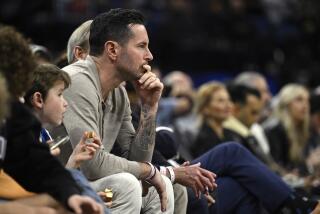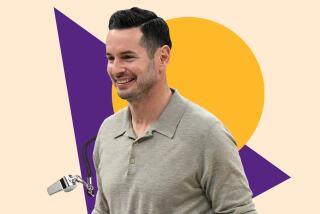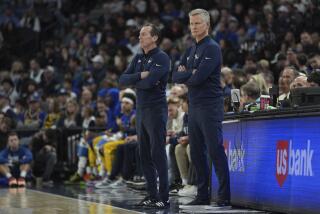This Is No Odd Couple of Coaching
- Share via
SEATTLE — Bernie Bickerstaff doesn’t remember exactly when he met K.C. Jones, but it most likely was in San Diego, when Bickerstaff was the coach at the University of San Diego and Jones ran the show for the American Basketball Association’s Conquistadors. Or maybe it was earlier, at the Final Four at the University of Maryland--the year, Bickerstaff recalls, that St. Bonaventure played without Bob Lanier.
It’s been that long. But dates, times and details never have been important to Bernie Bickerstaff when it comes to K.C. Jones, and vice versa. They have spent the better part of two decades mining each other’s mind for basketball and life skills. That was the case when Jones was the coach of the Washington Bullets and Bickerstaff the assistant eager to get out on his own.
And it’s the case now that Bickerstaff is the head man for the SuperSonics and Jones, coming from a vice president’s spot with the Boston Celtics, is his assistant and basketball consultant. But the two of them always have seen it as peer and peer.
“This organization has done very well since Bernie has been here,” Jones said at Seattle Coliseum recently. “He’s been the past two years in the playoffs. They’ve been doing pretty good. What I bring is my expertise to what championships are about, my knowledge of the game and being involved with very successful teams at high levels. So he has that source to tap.
“We’ve spent a lot of time together, a very close environment. He asked if I would be interested, and if I would, talk to (SuperSonics President) Bob Whitsitt. It sounded very nice to me. If it wasn’t Bernie . . . no, (I wouldn’t have taken the job) as an assistant.”
Bickerstaff couldn’t really describe his relationship with Jones, 12 years his elder. Their reunion has been a big deal here, but these are men with a fiercely independent streak, who have had individual successes.
This much is fact: They are basketball disciples of the late Phil Woolpert, Jones’ and Bill Russell’s coach at the University of San Francisco in the mid-’50s and Bickerstaff’s coach a decade later at San Diego. It was Bickerstaff who succeeded Woolpert as head man at USD.
By the time Jones went to the then-Capital Bullets in 1973, he felt comfortable enough with the local college coach to bring him along. The Bullets made the NBA finals twice.
Now, Bickerstaff said, “the relationship hasn’t changed. It’s about what we can do to help these players win, and it also includes my other assistants. The only thing that’s important here is that we as a unit be successful and try to contribute to the basketball team. It’s the players that will get it done. I won’t get the credit, K.C. won’t get the credit.
“Now obviously it’s a nice story to write if you want to get into issues. Somebody’s got to have a story but I couldn’t give a damn what people think. The bottom line is that no one really knows but K.C. and I. The rest is just conjecture.”
The Washington Bullets were getting swept by the Golden State Warriors in the 1975 finals, and the CBS camera zoomed into the Washington huddle. There was Bickerstaff drawing out a play while Jones watched. Heretical, or so people seemed to think afterward.
It was one more indication, critics said, of Jones’ laid-back style, one that couldn’t motivate men when it counted.
“That’s been talked about enough,” Bickerstaff said. “I’ve spoken about that a zillion times. Everybody’s got to be over somebody. The media had picked Washington to sweep and we were swept. So somebody’s got to be the fall guy.”
“If anybody looked in my huddle, they’d see it,” said Washington Coach Wes Unseld, the Bullets’ center in 1975. “I’m a lot like K.C. I don’t believe that anything you draw in the huddle is going to make any difference. If you’ve been practicing it all for six months and it doesn’t work, drawing it in the huddle isn’t going to make it work.
“K.C. was the type of guy that believed you worked on stuff in practice and you do it in practice. There are no miracle plays. I was there. I know what happened. K.C. controlled the huddle, controlled the timeouts, told us what he wanted done. He didn’t have to pull out a board and draw things for the TV crew. I never understood why that got so much play or what was so important about that one incident, that perception.”
But it was just that--perception--that branded Jones, until he won championships in Boston in 1984 and 1986; branded him even though his teams in Boston and Washington had won division titles in seven of his eight years as coach, and his .706 winning percentage was second in NBA history to that of the Lakers’ Pat Riley.
“I’ve been in the finals as long as I’ve coached,” Jones said. “I’ve been in the finals four out of five years and (won) two championships. This is a laid-back coach? Pat Riley, same thing. He’s been there more than I have and done very well.
“In coaching the Celtics I did with that team what, say, a pistol-whipping coach could not do. They say, ‘Well, he had Larry Bird.’ So did the other coach. I went to the finals four times and before I got there the team went to the finals once. When they put labels on you, you’re a laid-back coach or you’re a Marine sergeant.”
Was that just a shot at Bill Fitch, Jones’s predecessor and a firebrand of a coach if there ever was one?
You know K.C. Too laid-back.
“K.C. was laid-back as a player, but he played hard,” Bickerstaff said. “I don’t think you can always judge people by their outward appearance. Wes (Unseld) was not a player who made a lot of noise. Verbiage means nothing. It’s what you do on the court. My 10-year-old knows the right thing to say now. So that means nothing anymore, unless you’re giving a speech.”
Jones’ coaching career seemed to be at an end on the Silverdome floor, when the Detroit Pistons knocked out his Celtics in the Eastern Conference finals in 1988. He spent a season in the front office and wasn’t expecting to get back to coaching. “I said, ‘Retirement, yes, but always have an ear,’ ” Jones said.
There was intrigue in the New Jersey Nets’ job, but Fitch got it. So when Bob Kloppenburg left the SuperSonics’ bench to become their full-time scout, that left an opening on Bickerstaff’s bench. He got in touch.
Jones listened. And he’s here. He isn’t exactly responsible for Xs and Os, not a scout. What he is is familiarity and experience, Bickerstaff said.
“We all would be lying if you said you don’t have any kind of ego,” Bickerstaff said. “But those things you put aside, especially when you’re with solid people. People say what they feel and you deal with it and you listen.”
“I had nothing to prove by coming out here,” Jones said. “Others may think, ‘You go to this lowly position of assistant coach.’ Ambition and status at this point in time means not a thing to me. What matters is the relationship we have. It really doesn’t matter what other people think. We’re able, with one another, to be totally open and enjoy the relationship.”
After all those years with the Bullets, in San Diego, and at Woolpert’s house in Sequim, Wash., talking basketball late into the night, one thing these two are is open with each other.
Said Unseld: “The big thing in this profession, because of all the comings and goings, is that you’ve got to feel there’s somebody back there covering your back. I know K.C. felt that with Bernie and I’m sure Bernie feels that with K.C. I haven’t been in this business long enough to know, but I get the feeling that that’s very important to coaches.”
Sure it’s important to Bernie Bickerstaff, to have someone who, in case his ulcer problems flare up again, could take over. But it’s more than that too, even if he tries to keep it to himself.
“If it were not for that initial opportunity,” he allows, “who knows?”
“When I was fired at Washington, he stayed there another 12 years,” Jones said. “And I’m in Boston. When my name was mentioned you never heard Bernie’s and when Bernie’s name was mentioned you never heard me. That’s just something that’s come about since we’ve been in Seattle.
“But we’ve managed to be as successful as we have been, as we are. It has come under very stressful conditions. Yet we’ve succeeded.”
More to Read
Go beyond the scoreboard
Get the latest on L.A.'s teams in the daily Sports Report newsletter.
You may occasionally receive promotional content from the Los Angeles Times.










